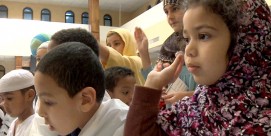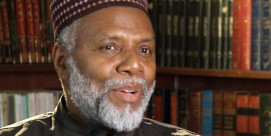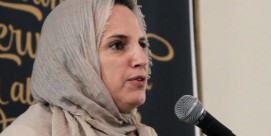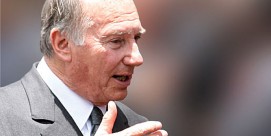In This Episode << SLIDE LEFT TO SEE ADDITIONAL SEGMENTS
Imam Yahya Hendi Extended Interview
Read the full interview about Ramadan with Imam Yahya Hendi:

There are five things every Muslim has to do. Number one: shahadah, the testimony of faith — to testify that there is no deity but God and that Muhammad is God’s messenger. Number two: to pray five times a day — morning, noon, afternoon, sunset, and night prayer. Number three: to give zakat or charity to the poor. Number four: to fast the month of Ramadan. And number five, to perform the hajj, the pilgrimage to the city of Mecca, at least once in your lifetime.
Now we are in the month of Ramadan, and [it] is one of the most important experiences one could go through as a Muslim. The Islamic calendar is a lunar calendar; it depends on the moon. Ramadan is the ninth month in the Islamic calendar, and it changes every year. Every year, scientifically speaking, loses 10 days. If Ramadan starts on the 15th of October this year, [next] year it would most likely start on the 5th of October.
Ramadan is the month in which Muslims believe the Torah was revealed to Moses, the gospel was revealed to Jesus Christ, the psalms were revealed to David, and the Qur’an was revealed to the Prophet Muhammad. Ramadan is the month that, according to Islam, God has chosen to speak to his prophets.
Every Muslim has to fast at least the month of Ramadan, but after that, Muslims are encouraged to fast, for example, like in Judaism, Monday and Thursday. Muslims are also encouraged to fast the 13th, 14th, and 15th in every month in the Islamic calendar. Muslims are encouraged to fast as a token of gratitude to God. It becomes a personal experience to decide when and how and where to do it.
Ramadan is what I call a month of training, a course of training. Every Muslim goes through this training for 30 days. I call it a month of autoemancipation, self-liberation. Ramadan emancipates me from myself. It emancipates me from my desires. It allows me to live in this world, but not of it. It liberates me from being controlled by my desires, because I don’t want to be controlled by my desires. People could easily get angry; people could easily lose their temper; people could easily become immoral and interact with others in a very immoral way because of their selfishness. Ramadan teaches me to give up on that selfishness for the sake of being a good fellow human being with others.
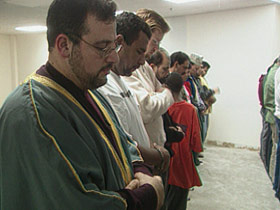
Fasting is to abstain from food and drink or any intimate relationship with your spouse from dawn to sunset. Not every man, not every woman, not every child could do that every day. There are people who are exempted from fasting according to Islamic teachings, such as breast-feeding women who may not be able to fast because they have to produce enough milk for their children; senior citizens, older ones who cannot fast because of their age. People with permanent diseases who are on medication throughout the day are also exempted from fasting. Travelers are, also. There are many types of people who may not fast.
Even if you don’t fast, you have to continue being in the spirit of fasting. An amount of money for those who cannot fast is supposed to be given to the poor and to the needy in the neighborhood. Those who cannot fast would calculate how much money they would have otherwise spent on food that day — let’s say $30 a day on food. Thirty times 30 days a month — that is $900. They will take that $900 and give it to the poor in the local community. When my wife was pregnant, she could not fast. It was her choice not to fast. She decided to calculate how much money she usually spends on food every day. It was almost $3,000 a month in food, and she decided to take that money and give it to a poor family within our neighborhood.
A fasting person would start his day with the suhoor, a light early morning meal. … That would help sustain them the rest of the day without food and drink. This has to happen before the sun rises. Immediately after that, a fasting person would conduct or perform his or her morning prayer. Then they would go on with their normal activities every day. Then later, when sun sets, they break the fast by usually eating a date and praying the sunset prayer. Muslims usually try to do that in a family setting. Ramadan helps Muslims “reassure” their family ties, so most Muslims would usually like to break the fast by inviting other family members or even friends to that break-of-the-fast meal. If they cannot, they try their best to break the fast with someone else they know.
After they do that, they go to the mosque, to a special Ramadan prayer called Taraweeh, which takes almost an hour, hour and -a half, sometimes three hours; it depends on the imam and the local community. That prayer usually is used to recite the entire Qur’an in the month of Ramadan. The Qur’an would be divided into 30 parts, and every part would be recited on that day. Usually, our imams here in the states pick a certain theme on that day within those verses and speak about that as a sermon. After that, people go back home, sleep, and start the day again — for 30 days.
The Qur’an is very important for Muslims, and Ramadan is very much connected to the Qur’an. Muslims believe that the Qur’an was revealed to the Prophet Muhammad in the month of Ramadan, and therefore Muslims try to connect with the Qur’an, believed to be the very word of God, in the month of Ramadan. Muslims try to divide the Qur’an into 30 parts, and they read one part every day, and by the end of Ramadan they have concluded reciting the entire Qur’an. Usually Muslims are encouraged to try to not only read and recite the Qur’an and chant it, but also to understand the message of the Qur’an. The imam, for example, tries his best to focus on one theme every night, so by the end of the month, people have focused on 30 themes and concepts in the Qur’an in the month of Ramadan.
After Ramadan comes the Eid, the three-day holiday during which Muslims pray and invite others to enjoy the ability to have fasted for the month of Ramadan, the ability to have gratitude to God, the ability to have given enough charity to the poor, enough charity to the needy. They have a path to self-emancipation and liberation; they have become part of a larger community rather than continuing to be selfish. They are not anymore concerned about their own personal ego and needs. They are now concerned about the needs of their fellow neighbors, their fellow human beings — the needs of everyone they come across.
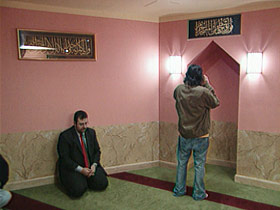
Fasting is not an easy practice. You need really to get used to it. But once you are used to it, it’s very normal and actually a very natural practice for us as human beings. Usually, for those who don’t fast that much or that often, in the very first few days it is very difficult. But because of their conviction, because of their belief in God, because of their belief that this is a duty that one has to undertake, people do it. Once you are past three or four days, it becomes very normal.
People can easily pass those three days with conviction because they are so convinced that this is the command of the Almighty One, because they’re so convinced that the Prophet Muhammad did it, hence I have to do it. We believe that with fasting, one improves. We believe with fasting, one beautifies his soul or her soul. With fasting, one becomes closer to God. One becomes a better human being, a better person. There are fruits that one would bring about just by fasting. The conviction, the belief in the outcome of fasting would be enough power to energize people to fast past the test of the [first] three days.
Prayers help, with no doubt. Prayer at the beginning of Ramadan helps because at the end of the day there are many temptations around us. You go to work, and there are people around you who are already having their lunch, having their dinner. As you pass by a restaurant and you get a great smell, very attractive, you say, “Wait a minute, I need to get into that Chinese restaurant right now.” I love Chinese food. I just love it. So, for me, just passing by a Chinese restaurant at 12:00 midday, and I cannot just go in as I usually do, is quite difficult. But I believe in sustaining myself and being in control. This is what fasting is all about — my ability to say to my desires “No,” even if my desires want me to do something.
I might want to be angry with someone because of something. I say to myself, “No.” My temptations might lead me to abuse or curse or react in a violent way to someone’s attack on me. The month of Ramadan tells me, “No, don’t react. Be always yourself.” Prophet Muhammad told his followers, “If you happen to be fasting and someone curses you, do not curse back; always remember that you are fasting.” In other words, you are in control of yourself now, not the other. Do not allow others to lead you to becoming an immoral person. Always be yourself regardless of the circumstances.
Prophet Muhammad once told his followers that those who are fasting, yet do not avoid vain talk and action, do not need to be fasting. Fasting is meant to teach me to give up on cursing others, abusing others, looking down on others, speaking ill of others. Some people could say, “Well, Muslims do that very well in the month of Ramadan, but once the month is over, then I go back to becoming immoral.” I don’t think so. I think this is a training course for us, to sustain that personality throughout the year. Then after a year, I might start losing the momentum. This is why another month of Ramadan comes, to keep me on the path of guidance, on the path of righteousness.
I fight the temptations of life with conviction, and with the belief that if there is a will, there is a way. If I have the will to do something, I have the way to find the path to that will. You know, it’s as easy to find an excuse why you need to lose [your will], but I also believe that it is very possible to find the conviction to bring your will about.
Some children want to get into the practice that they see their parents doing. Some of them are not interested because they do not understand what it means to fast. My own children are very much interested in doing what we are doing. However, three or four hours later they’re so hungry. They don’t understand; they really need to eat. Our older daughter, or the younger one, tries to fast for three or four hours. Then she goes to the fridge and says, “Daddy, Mommy, can I have just a small sandwich?” “Of course,” we say. Then three hours later they say, “Well, I fasted for three hours. Could I just have one single bite?” So, she practices it herself. She finds a way to get into the practice of fasting.
When I was seven years old, I fasted for two weeks. They were so difficult; I remember them. But everyone around me was fasting, so it was easy for me to fast because everyone was doing it. The year after that, when I was eight, I fasted three weeks. The year after that, I fasted the entire month. Since then, I have always fasted the month of Ramadan. I never broke any of those days.
The month of Ramadan is expected to teach us to be in control of ourselves, in control of our desires, in control of our wants. It’s easy to want to have 10 items of food on your table, because that’s what our desires want. I want to have spicy rice and soup and this and that. The month of Ramadan is the month in which we learn how to control our desires, how to control all the temptations out there. Families are encouraged to have one, two, maximum three items of food on their table.
Many families go over that. Sometimes you’ll find 20 items of food on their tables. And very often this food is thrown into the trash a few hours later, which is exactly the opposite of what Ramadan is supposed to teach us. Ramadan is supposed to teach us how to save for the poor, how to give some of what we have for the poor and the needy and not to throw anything away, to show gratitude to God. Some of those practices are exactly the opposite of what Ramadan is meant to be.
In many countries, we have special sweets for Ramadan. You have qatayef in the Arab world. You have halwa in India and Pakistan. These types of sweets are made only in the month of Ramadan. Is that a religious thing? No. It is what cultures have developed throughout the last 1,400 years. But most Muslims are encouraged to break the fast with a small date, a drink of water, [then] pray [and] come back for a very humble, simple meal — unless some families want to show hospitality to guests. Then they might offer them a little bit bigger meal, only to show some hospitality.
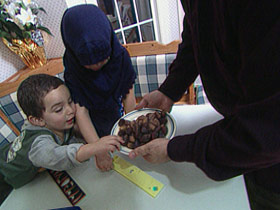
There’s no specific reason Muslims break the fast with dates, except that the Prophet Muhammad used to break his fast with dates. The Prophet Muhammad, for a Muslim, is an example, a role model. What he did is something we would like to do. The Prophet Muhammad used to reach out to his neighbor. The Prophet Muhammad used to have a Jewish neighbor, an old Jewish lady, and the Prophet Muhammad got into the habit of visiting his neighbor early in the morning every day. This is a routine for him. He used to look after her, to fix breakfast for her, clean her home, then go back to his home. Every Muslim is expected to do that if he or she has a neighbor. Even if from a different religion, Muslims are encouraged to reach out to those neighbors, look after their needs.
Muslims believe that the Qur’an was revealed to the Prophet Muhammad during the night of the 27th of Ramadan, and therefore what they try to do is to spend that entire night in the mosque. You go to many mosques and you find thousands or hundreds of people just there from sunset all the way to sunrise, praying to God for forgiveness; praying to God for salvation; asking God to accept them in heaven; asking God to heal their sick ones; asking God to bring back the absent; asking God for safety in life and more prosperity in life; asking God for a better life.
This is called Laylat al-Qadr, the Night of Power, the night in which the Qur’an was revealed to the Prophet Muhammad. Many Muslims use this night as well to donate more money to the poor. Muslims believe that during the Night of Power, your deed is equal to 1,000 deeds in the rest of the year. If you donate $1 to a poor family during the Night of Power, it will be as if you have donated $1,000 to that person, and therefore God will reward you for $1,000. Many Muslims actually wait until the Night of Power to donate their wealth and their money to the poor and to the needy.
Many mosques have lists of poor families. Usually on the 29th and the 30th of Ramadan, those mosques reach out to those poor families to give them the money that they have collected during Ramadan, and especially on the Night of Power.
I come very early in the morning to Georgetown University. I leave home around 4:30 a.m. to be here on time for the morning sahoor or breakfast, the meal with which Muslims start their fasting. Sometimes you’ll have two people coming to sahoor; sometimes you have as many as 30 or 40 students. I also do my sahoor at home very often. My wife wakes up, my children wake up, and if we have Muslim neighbors, they would also wake up and come over. At 5:00 in the morning, people are enjoying their breakfast together — a very light meal, however. Immediately after that, people go into meditation and prayer to start the day.
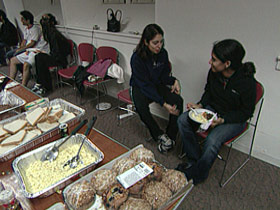
During sahoor, leaders are expected to serve the food. The idea is that, as Prophet Muhammad said, the leaders of people are expected to serve, to cater to the needs of others, not to order and command others. Imams, in this case, would be expected to be the ones to cook the food, prepare the food, serve the food when others are there to just enjoy the day.
Ramadan really teaches me as a Muslim to connect with God, so I start my day with a prayer. I start my day with a meditation. I start my day with a special personal prayer in which I sit down and reflect on my relationship with God, with the Divine, with the Almighty Creator. I reflect on my relationship with God in the way I interact with my fellow human beings. My fellow human beings are not all Muslims. Some may be Jews. Others may be Christians. Others may be Buddhists or Hindus. Others may be of other religions. As a Muslim I am expected, in the spirit of the month of Ramadan, to reach out to all people.
I finish my meditation; I sit down; I do some work. Then I say, “Whom am I going to visit today? I need to visit someone who is not a Muslim.” I need to make the point that I am not someone who would like to exclude himself from society, but rather be a part of society. I reach out to a Jewish friend, visiting with a rabbi whom I have known for some time. But he’s very busy in his congregation, I’m very busy — we don’t get to see each other very often. The month of Ramadan says, “Imam, you better be in control of your time. You better reach out to your friend whom you have not seen for some time. Go give him a hug. Give him a kiss. Why not? Sit down and talk about something. Be good brothers. Talk about why Jews and Muslims are not enemies.”
I don’t believe that Jews and Muslims are enemies. I don’t believe that Muslims and Christians are enemies. I believe we are friends. I believe we are partners. The month of Ramadan gives me the spirit to reach out to them, to ensure everyone that we are brothers and sisters; we are partners on the path to God. I visited with the rabbi at the synagogue just to tell him, “Brother, you are indeed my brother. What can we do together to make this world a better world for all of us?”
The style of life we all have is busy. We are all requested to do all kinds of things: leave early in the morning, come back home, and even when we come back home we have other things to do. Ramadan really, really teaches us how to be organized, how to manage our time. There are five daily prayers, and every prayer has its own time. You know when it starts; you know when it ends. You know when your appointment starts; you know when it ends. When you are expected to be somewhere at 5:15, you have to be there at 5:15 and not 5:30, not 7:00, as some people may do. Ramadan really teaches Muslims always to be on time. I am not saying that all Muslims are always on time. We also fail to carry out the teachings of our religion, but that is what Islam is expected to teach us — five daily prayers.
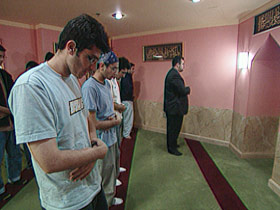
We organize our schedules, our appointments, around those times. I make sure that I do not have a meeting during my noon prayer. When my noon prayer comes, that is the time for me to say, “Sorry, colleagues, I need to pray.” Why do I need to give up on my meeting? I’m not giving up on my meeting. I really need to recharge. I recharge my batteries. I recharge my energy by standing before God, the source of all energy and power, to say, “God, help me go on with the rest of the day. It is only you who can help and empower me. And unless you give me that power and energy, I cannot make it.” I feel that charge from God.
I go into another meeting, then to another meeting. Then, when I’m almost tired and exhausted, I need more energy from God. I go on to another prayer. I say, “God, thank you for having helped me throughout the last seven or eight hours. I still have another five hours to go. It is you who can empower me to make it.” I feel that energy coming from God. I rely on God to be organized. I rely on God to be a better human being.
To be better organized, to make sure that you’re always on time, I have my own personal digital assistant [PDA], a very sophisticated PDA. It’s like a small personal computer. It goes off when the prayer time comes. The adhan or the call to prayer starts, and I very often tell my colleagues in a meeting, “Sorry, these are two minutes for me. You need to wait.”
I have the entire Qur’an on my PDA, so I can actually ask it to recite any of the chapters within a second. On it I have my appointments, I have my contacts. I can hook up to [the] Internet anywhere in the country. This specific one is also a navigator that connects you with a global positioning system, so I’m never lost. I hope I’m never lost spiritually and never lost geographically as well.
Ramadan is a time to reflect on my relationships with my wife, with my children. Have I been doing well or not? Have I failed? Have I succeeded? It’s a time for me to look into myself and see if I have accomplished what I wanted to accomplish in the previous year. Am I willing to go into another year, and what kind of year do I want to have? Have I been in control of myself or not? Have I lost it, and why did I lose it? Am I going to be a better person for the year to come? The month of Ramadan tells me that I am not just a single human being who lives on his own on this earth. I am part of a human family. When I reach out to the Jews and I reach out to the Christians, when I reach out to the Buddhists, when I reach out to every human being whether they do or don’t have a certain faith, I do that in the spirit of the month of Ramadan
The month of Ramadan is a time for me to reconnect with my God. It’s a time for me to recharge for the rest of the year. It’s a time for spiritual empowerment. It’s a good time for me to reach out to my neighbors. It’s a time for me to review my account with God and with others around me. It reminds me if I have a responsibility that I have not fulfilled. Ramadan is a time for me to connect with the Qur’an. The Prophet Muhammad said, “If people were to know how good Ramadan is and the kind of good things it can do for people, they would wish that the entire year is Ramadan.” I really wish that the entire year is Ramadan.


